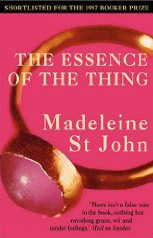Review of The Essence of the Thing by Madeleine St John (and a general rant from Kara Martin)

The publicity blurb sounded really interesting: "Can we ever really know anyone? Even those closest to us? With her comic and tender vision the brilliant Madeleine St John… takes us into the changing nature of the human heart."
This is exactly the sort of material I mine in this book blog. I was further interested in the fact that it was Booker shortlisted, and the publication date was September 2009. It was ticking plenty of boxes as pertinent for review.
A bonus is that Madeleine St John is an Australian author.
As I began to read the book, however, I felt I was being taken back in time. It felt strangely dated. Some of the issues could have been easily resolved with a text message. Also, it was set in England, but it was a very English novel. I could not sense anything Australian in the angle taken, the sensibilities, the language.
I had a closer look at the book and the author, and I felt a very Australian response: ripped off!
Madeleine St John was born in Sydney but lived in London from graduation for 46 years until her death two years ago. Two years ago?
This book was an example of retrospective publishing. The book had been reissued, but artfully packaged to hide the fact that it was first published 12 years ago. It was shortlisted for the Booker Prize in 1997.
(As an aside, why do we always claim as Australian anyone born here who wins a prize, even if they have few attachments to the country? What is the point? Is it a sign of our desperation to feel globally significant?)
This happens time and again. You pick up an attractive looking book with a lovely cover, and discover that it is a book you first read ten years ago. Hopefully you discover that before you buy the book. Sometimes the title has been changed, leading to even more confusion.
That rant aside, I thought this was an interesting novel. St John has a clear and distinct voice. She is excellent at dialogue, even if it is a very English idiom:
"There's no nice way to say this," he said. "But I've decided - that is, I've come to the conclusion - that we should part."
The ice and darkness were now inside her: all her entrails froze.
"I think I'll sit down," she said.
It is a book about relationship breakdown, and the slow and painful process of recovery. In the midst of it there is some spiritual pondering
Interestingly, Nicola (the "she" in the relationship) discusses with her friend about how preposterous the Gospel is, and then suspects that this is its chiefest recommendation. She also wonders at the utter mystery of apparently quite intelligent people believing in it. She is very attracted to the idea of salvation, however.
In the end Nicola is able to reinvent herself, while Nicholas (the "he") regrets his lack of ability to commit, but it could be too late.
It is a good book, not a great book, about the trickiness of two sinful people trying to sustain a relationship. It is dated in language and context, but not in content. And what is the essence of the thing? Nicola believes the essence of relationship is the balance between bitter and sweet.
I think the essence of relationship is grace, nothing else can sustain it.





















